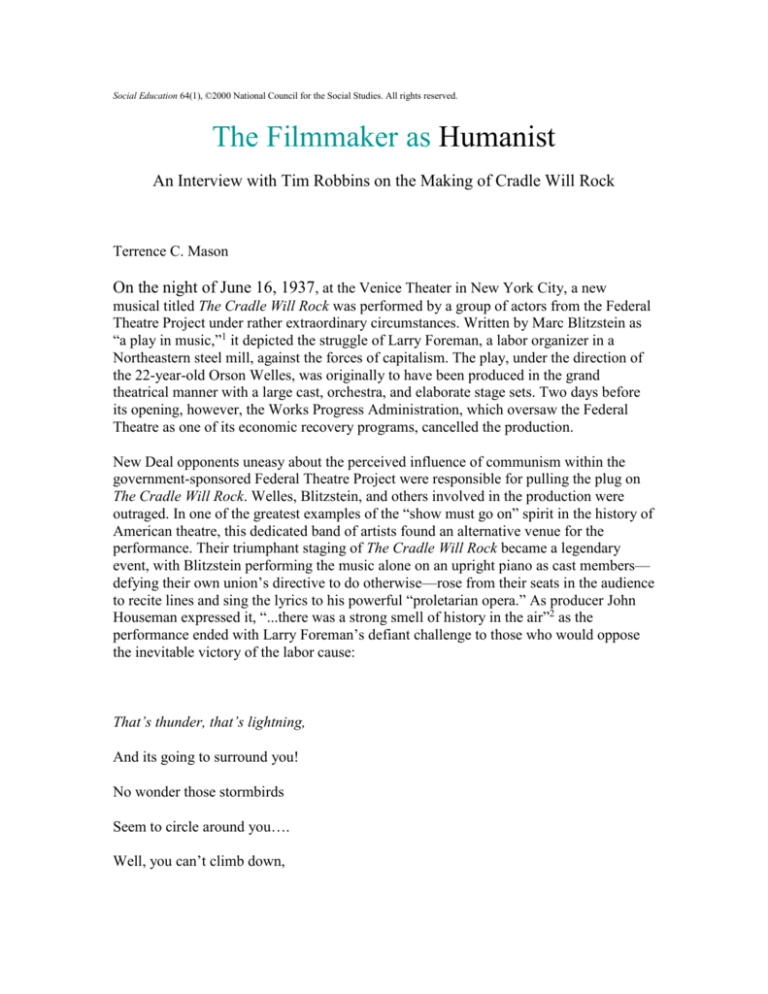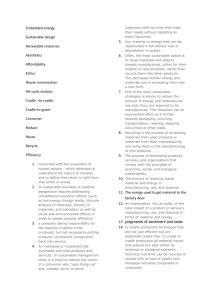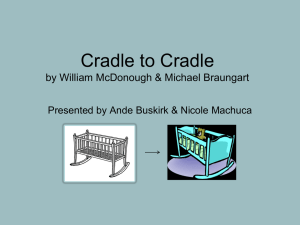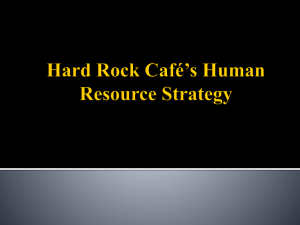
Social Education 64(1), ©2000 National Council for the Social Studies. All rights reserved.
The Filmmaker as Humanist
An Interview with Tim Robbins on the Making of Cradle Will Rock
Terrence C. Mason
On the night of June 16, 1937, at the Venice Theater in New York City, a new
musical titled The Cradle Will Rock was performed by a group of actors from the Federal
Theatre Project under rather extraordinary circumstances. Written by Marc Blitzstein as
“a play in music,”1 it depicted the struggle of Larry Foreman, a labor organizer in a
Northeastern steel mill, against the forces of capitalism. The play, under the direction of
the 22-year-old Orson Welles, was originally to have been produced in the grand
theatrical manner with a large cast, orchestra, and elaborate stage sets. Two days before
its opening, however, the Works Progress Administration, which oversaw the Federal
Theatre as one of its economic recovery programs, cancelled the production.
New Deal opponents uneasy about the perceived influence of communism within the
government-sponsored Federal Theatre Project were responsible for pulling the plug on
The Cradle Will Rock. Welles, Blitzstein, and others involved in the production were
outraged. In one of the greatest examples of the “show must go on” spirit in the history of
American theatre, this dedicated band of artists found an alternative venue for the
performance. Their triumphant staging of The Cradle Will Rock became a legendary
event, with Blitzstein performing the music alone on an upright piano as cast members—
defying their own union’s directive to do otherwise—rose from their seats in the audience
to recite lines and sing the lyrics to his powerful “proletarian opera.” As producer John
Houseman expressed it, “...there was a strong smell of history in the air”2 as the
performance ended with Larry Foreman’s defiant challenge to those who would oppose
the inevitable victory of the labor cause:
That’s thunder, that’s lightning,
And its going to surround you!
No wonder those stormbirds
Seem to circle around you….
Well, you can’t climb down,
and you can’t sit still;
That’s a storm that’s going to last until
The final wind blows….
and when the wind blows…
The Cradle Will Rock!3
Approximately four years earlier, in what art critic Robert Hughes calls “the stormiest
and most grotesque fiasco in the history of American patronage,”4 Mexican artist Diego
Rivera was commissioned to paint a mural for the lobby of the RCA Building in New
York City’s Rockefeller Center. At the request of the Rockefeller family, who had
previously commissioned works from Rivera, the new mural was intended to glorify the
triumph of technology in our world. Given Rivera’s well-known left-leaning political
views, however, few were surprised to see images of the evils of capitalism and the
virtues of the working class appear as the mural began to take form. The most shocking
of these was a portrait of Lenin among the figures portrayed in the mural.
Needless to say, the Rockefellers were offended at the portrayal of one of the leaders of
the Bolshevik Revolution among the faces of those representing the ideals of American
democracy. In response to Rivera’s unabashedly polemical creation, Nelson Rockefeller
requested that Lenin be painted over and replaced with someone more congruent with his
family’s view of American values. Rivera took this as an affront to his artistic integrity
and refused to alter the piece, the upshot being that the artist was paid his commission
and dismissed from the project. Eventually, the Rockefeller family ordered Rivera’s
nearly-completed work to be stripped from the walls of the lobby and destroyed.
While these two events may represent important moments in the history of art in
America, could they serve as the basis for a Hollywood movie? One filmmaker thought
so. In the most recent of his three writing/directing efforts, Tim Robbins has merged
these two seemingly unrelated events in a film titled Cradle Will Rock after the Marc
Blitzstein play that forms the nucleus of the film’s story. Presented as a “madcap romp,”
the film features a mix of real people—including Welles, Houseman, Rivera, Nelson
Rockefeller, and William Randolph Hearst—and fictional characters. While not strictly
historical in its presentation of events, the film nonetheless paints a compelling portrait of
Depression-era America as people tried to maintain a sense of optimism in the face of
economic woes and the shadow of rising fascism in Europe. Paying homage to the
“screwball comedies” of the 1930s, Cradle Will Rock is at once zany and profound, and
can offer students a window into a watershed period of American history (see “Cradle in
Context: Resources for Teachers” at the end of this article).
No stranger to political and social themes as both an actor and a writer/director, Robbins
has gained a reputation in the film industry as a liberal social activist, although he shuns
the label of “libera#148; and prefers to see himself as primarily “humanist” in spirit. His
first project as a writer/director, Bob Roberts, was filmed as a humorous and satirical
“mock documentary” laying bare the crass motives behind a cynical politician’s
campaign for the Pennsylvania governorship. He followed this with the highly-acclaimed
Dead Man Walking, exploring the death penalty through the eyes of Sister Helen Prejean
and Matthew Poncelet, a convicted murderer awaiting execution in a Louisiana prison.
Regardless of the label applied to him, it is evident that Robbins is interested in using the
medium of film to address social issues and historical themes.
Shortly after the completion of Cradle Will Rock and just prior to its screening at the
1999 Cannes Film Festival, I interviewed Robbins to explore his views on the role of
artists as “educators” within our society. In the excerpts from that interview which
follow, Robbins offers his perspectives on such diverse topics as what it means to
exercise one’s rights in a democracy, the kind of history worth learning about, the power
of art to convey important social messages, the sources of violence in our schools, and
what schools should do to prepare socially aware and active citizens. I began the
interview by asking him to talk about how the idea for his most recent film originated.
What led you to choose the particular characters and events in Cradle Will Rock as
the subject for a film?
The subject came to my attention from the story that was told to me about the evening
that the show [Blitzstein’s The Cradle Will Rock] was performed for the first time with an
audience ... it seemed to be a remarkable ending for a film. So I started from that point
and worked backward, trying to fill out the stories of the people involved and to find
other stories within the society and time that either reflected or contrasted in some way to
the story of The Cradle Will Rock. My interest ...was in creating a moment of heroism
that had nothing to do with war or violence, to show how a pretty much anonymous
person affected so many people with a moment of courage, and gave so many people the
courage to exercise their rights within a democracy themselves.
It is my belief that the actions of the one can influence the many. Olive Stanton [who
played Violet in The Cradle Will Rock], when she stood up in that theater, did a service to
democracy and to freedom of expression. All of those who stood up were risking their
lives, or if not their lives, certainly their livelihood, and their incomes, and their jobs, and
their standing in the union, and their ability to be actors in the first place. This isn’t like
today; there was no safety net, there was no welfare system, there was no unemployment
insurance, there were no free health care and free health clinics. Very few of these social
programs existed when this happened. It started around then, but nothing was in place at
that point...
I just got really inspired by the idea of the one person who, for whatever reason, risked
everything she had to sing. To me, that’s really at the heart of freedom, the idea of the
one person that can influence people. It happened in this instance, it happens with bullies,
it happens with the one person that stands up in front of the mob and says, “No more,
you’ll have to go past me.” How does that one person stop the mob? This has always
fascinated me. So to me that person is so much more courageous than our image of
courage that has to do with leading the battalion of two-hundred into a certain defeat, or a
certain hellhole.
This film deals with historical subject matter. Have you always had an interest in
history?
Not in school; after school. I guess that A Peoples’ History of the United States kind of
turned things around for me, the Howard Zinn book. It made me more interested in
telling the stories that are in history. I like the idea of telling stories that make...more
sense to me than the standard history. I’m more interested in telling it from the peoples’
perspective. It’s not about the icons; I mean, we can have some fun with the icons. But
it’s really more about the people we don’t know about.
In Cradle Will Rock, you present historical events simultaneously that didn’t really
occur together. As a filmmaker, what do you feel about your responsibility for
historical accuracy?
I don’t have a responsibility for historical accuracy; it’s a movie, it’s a fiction, even if it’s
based on a true story. I think the credits at the beginning will say “a mostly true story.” If
we can take that to another degree, you can say, “Well, listen, you weren’t in that room,
how could you possibly know what that conversation was?” All of history is subjective,
is slanted towards the writer’s viewpoints and beliefs. Every historical record you read,
including Zinn, has the writer’s imprint on it. There is no objective historian. All of the
history I was taught up until college, including college to a certain extent, was the history
of the victor, the winner. You don’t often hear from that other point of view, and when
you start reading Zinn, you hear about history from the point of view of the vanquished,
the victim of genocide, the Indian. This is the history of the person that was beaten over
the head with a billyclub and not interviewed by whatever historian was writing about the
labor movement.
At one point in the film there is a conversation where two characters compare the
influence of Shakespeare’s Richard III with what historians have written about this
period. Are you making the point that Shakespeare may have more influence on
peoples’ understanding of history than do historians?
The point I was trying to make was that I believe that the artist is much more influential
and powerful than he believes or she believes; that, in fact, art survives a lot longer than
dogma. The museums are filled with social statements from various eras, or human
portraits of other eras. Our libraries are filled with plays that give us an understanding of
those eras and give us insight into the people of the time, customs of the time, and beliefs
of the time, far more than any politician’s speech would. No one remembers what
Woodrow Wilson was saying in 1918. We’re not reminded of that as much as we are of
Eugene O’ Neill, who is now playing on Broadway, Arthur Miller, Tennessee Williams,
all playing on Broadway right now.
What lessons from our history does Cradle Will Rock teach us, and how can we
apply this knowledge to contemporary issues?
This story offers a tremendous insight into what people thought at the time about labor
unions and strikes. But we have a very limited view of history. There are people who
could not tell you, for example, how ... generally, in the work place, there is a 40-hour
week. Well, a lot of blood was spilled to get that. A lot of tears shed, a lot of hard work,
and oppressive situations were overcome just to get that 40-hour week. There were years
and years of struggle to get that. I don’t think people realize that. I don’t think people
realize how important unions were to the American worker.
I think we can see that there’s always been a desire for people who run businesses to get
cheap labor, or slave labor, ideally. If you can’t get slave labor, you get cheap labor. If
you can’t get cheap labor, you try to do your best to keep your workers from unionizing.
When you can’t do that, and you have to have a union, then you start crying “fou#148;
when low profits are killing you, which is what a lot of the American corporations are
saying—“Okay, unions are killing us, our profit margin is down, we’re moving our plants
overseas”— in the constant and continuous effort to find slave labor, which they are
finding in the Third World now, Mexico, Indonesia, Vietnam, China. Everywhere there
are many deals being struck. Nike is the one that is catching a lot of the heat, but pretty
much all clothing apparel companies and shoe manufacturers and toy manufacturers are
getting incredibly cheap labor, or basically slave labor, to make their products. The
American worker has a leg up on the rest of the world in that we have certain rights that
have been there for a while, but that we take for granted.
Do you think the history of the labor movement represents a forgotten period of
American history?
I think, yes, that nine people out of ten couldn’t tell you who John L. Lewis was or why
he was important. There are historical records written suggesting that the labor union was
infested with communists and it was basically trying to destroy the capitalist system,
when in fact the heart of it was just a decent wage, decent hours, nonoppressive working
conditions that didn’t kill you by the time you were thirty-five. I was trying to give an
example of people at the time who were Americans, immigrants a lot of them, but
Americans, and they weren’t seeking to overthrow the government, they were seeking to
increase their quality of life, whether it was labor struggle or in theater.
But some of the characters you portray in the film were clearly opposed to the labor
struggle, for example, Hazel Huffman, the disgruntled woman who worked for the
Federal Theatre and testified to the Congressional Committee investigating it.
I found her in the Congressional Record. She was given a lot of time by this committee
because she was saying everything they wanted her to say. It is true that Hallie [director
of the Federal Theatre Project, Hallie Flanagan] had only half a day to refute all this stuff
and they didn’t call her back, the head of the program. So it was a bit of a railroad. This
woman existed and underneath it all, underlying a lot of this testimony, was a pro-fascist,
pro-racist agenda.
One of the things that made them incredibly threatened and angry about the Federal
Theater wasn’t communism, it was the fact that there were black people and white people
on the same stage sharing meals with each other, cohabitating in some cases. It drove
them absolutely nuts. Welles’s first play was an all-black Macbeth up in Harlem, and
when he went to form his own company, he brought black people with him into this
company. It was incredibly revolutionary. People thought that blacks were supposed to be
doing minstrel shows and that’s it. They were supposed to stay with their own, they were
not supposed to be doing Shakespeare on Broadway, or Marlowe. When Welles did
Marlowe, his Mephistopheles was African American. We found some reviews of the time
that were incredibly racist, saying that black people shouldn’t be doing Shakespeare and
things like this.
What are the parallels between that time period and the present? Do you think the
media and popular culture inform people’s beliefs and attitudes now in the same
ways that they did then, or not as much?
I think you have so many different choices of entertainment. It’s pretty much the same as
it was then, I think ...surely the people we remember the most from that time were doing
popular entertainment. Look at our great songwriters, Gershwin and Cole Porter. It
wasn’t [Bertolt] Brecht songs that they were doing. Just like today, you have popular
entertainers and you have people that are doing pieces like Cradle Will Rock. I don’t
think that changes much...I don’t think any society really has more Brechts than it does
Cole Porters.
Even though the purpose of entertainment is just that, to entertain, can’t some
entertainment also serve a kind of educative function? Do you see Cradle Will Rock
as that kind of film?
Well, you know, I would hope that first and foremost and primarily it is going to be
entertaining ...I personally don’t like theater and movies that are dogmatic and try to tell
you how to feel, tell you how to think. I think it is important when you are working in an
entertainment medium that you remember that it is entertainment, and you can do both.
You have to do both. Otherwise, you are talking about a lecture. I think [Frank] Capra to
a certain extent raised issues in his films that were immensely entertaining and provoked
thought. I thought [Preston] Sturges did that as well.
You have stated that you don’t see your films as being particularly political. But it seems
also that they’re dealing with somewhat political issues. Do you mean that your films are
not trying to lecture the audience?
I don’t like the word. I think the word “politica#148; actually means “safe,” doing
something to achieve a benefit for oneself. And I see them not as political issues but as
humanist issues. Dead Man Walking is a very humanist movie, it’s not a political movie
at all. If I wanted to do a political movie on the death penalty I would have explored the
politics of it.
…who’s benefiting from certain laws and policies?
Or the social implications of the death penalty, or the economic ones. The fact that it’s
basically poor people who are dying; yes, that’s mentioned in Dead Man Walking. But
what’s important about Dead Man Walking is simply the relationship between these two
people. To me that’s very much about humanity, not about politics. I’m trying to show
that this is a human being, even though he’s awful; even though he’s a bad person who’s
done bad things, he’s still a human being. And every human being is capable of
redemption and forgiveness; if not forgiveness, then certainly redemption of some kind.
The movie wasn’t made for people who are for or against the death penalty, the movie
was made to show the reality of a situation and to present a character who was guilty, to
take us all through what it means to kill that person, and then for us to make up our minds
about it. That movie is as much for people on the left as people on the right. In fact, there
were people on the left that were very uncomfortable with the movie because they hadn’t
gone down that road. What happens if the guy is terrible? What happens if he is guilty?
And for me, that’s as important as anything else, because if you’re going to be against the
death penalty, you have to be against it unconditionally.
Another of the issues in Cradle Will Rock concerns censorship, the censorship
related to the hearings in Washington about the Federal Theater and then
Rockefeller’s censorship of Diego Rivera’s work. How do you think this is an
important issue today?
Most importantly, self censorship. It relates to how the environment of the time can cause
people to censor themselves. And that’s why, when they [the actors] stand up at the end,
it is a real celebration of freedom because they are not censoring themselves, they are
taking a chance. They are taking a risk and they are exercising their rights within a
democracy, which is very difficult at times. There is always going to be overt censorship
in this society. Look what’s happening now with the first targets of [the Columbine
massacre], the Internet and video games, movies.
Is that justifiable, does that make sense?
I think it’s a combination of things, but when people start putting the blame on things like
that, I run the other way. For me, the thing that hasn’t been written about is probably the
truth of the matter. And when I read the newspapers and see the reports on television, I’m
always trying to see what they aren’t talking about. The two things they aren’t talking
about have incredible power behind them. Those two things are the fact that this war
[Kosovo] is happening at the same time, and no one is drawing the parallel between that
and Columbine. In fact, this kid, Harris, was interested in the Yugoslavian war and
thought it was really cool and he wanted to join the Marine Corps and he was turned
down. Why? And here’s the other thing that’s not being talked about, because he was on
anti-depressants.
We are in a society now that is medicating its teenagers in a knee-jerk way. What’s
happening is that we are cheating our children of a very important life lesson. The
depression goes away but it manifests itself in anger. Too many people are taking Prozac
and having these bursts of anger. It happened with this Harris kid, and it happened with
that kid in Oregon who shot up his class. He was also on anti-depressants. So those are
the two things I’d like to see talked about and dealt with. You can’t have a society where
the grownups solve their problems by sending in smart bombs and then be surprised
when teenagers try to solve their problems the same way. We’ve done it time and time
again, the past ten years, and throughout our history. We’ve been really quick to bomb
when there’s a breakdown of communication and difference of opinion.
Why do you think teachers should recommend that their students see Cradle Will
Rock?
It definitely would provoke discussion. Films can open the door to dialogue. Dead Man
Walking had an extraordinary effect on the dialogue about the death penalty in this
country. Sister Helen [Prejean], before the film came out, toured around to different
places and twenty people would show up. Now she has hundreds... Dead Man Walking
has had an impact at the grassroots level and also, to some degree, we know it has even
changed the Vatican’s thought on the death penalty. Before the Pope saw the movie, there
was a position by the Catholic Church against the death penalty, but [the Vatican] would
allow each society or government to choose whether to have it or not. After the movie
came out...the church was opposed to the death penalty across the board, hands down.
So I do really believe that film can have a great effect. It can also have a terrible effect on
people, as witnessed recently. There are people who see violent films and become
violent. Were they violent before? Yes, probably, but I don’t think it helps to show
carnage on the screen to kids. Certainly adults might be able to delineate better between
reality and fantasy, but I don’t let my kids see these violent movies. I don’t want them to
play these terrible video games where you are hacking people to pieces. You have to be
involved in your child’s life. So to a degree it is the responsibility of the parent. But it’s
not like Hollywood is shoving this stuff down people’s throats. People want to see this;
they are huge hits. If people don’t go, they won’t make them.
As a parent yourself, what do you hope your kids encounter in school to help them
become effective citizens and participate in a democratic society?
I guess most importantly, they have to come out of school with a healthy confidence to be
able to question. I think the best thing that can happen is that people are educated to
discern between what is real and what is not. In order to do that, you have to create an
environment that’s not oppressive. I’m all for tolerance in school. I think the best thing
that could happen in a school is for some kind of compassion to be taught to a child, as
well as the idea that when you go out into the world there’s more to be learned, and the
way you’re going to learn that is not by just nodding your head all the time. You have to
have the self-worth or self-confidence to be able to come out of there questioning.
In their excellent book about conducting historical inquiry with young learners, Levstik
and Barton suggest that “our students’ ideas about life on the American Frontier or the
Civil War…are at least as likely to be shaped by…movies like Dances with Wolves or
Glory as by anything in a history text.”5 This is why it is so essential for students to
become skilled in interpreting film and other arts. We know that films, by showing the
human side of events, can capture students’ imaginations. Films embued with social
content can help students develop more critical awarenesses about our history and our
political and social institutions. Finally, using films as examples, we can lead students to
consider how forms of artistic expression can both entertain and instruct, and what their
greatest strengths and limitations are in accomplishing these purposes.
Notes
1. John Houseman, Run Through: A Memoir (New York: Simon & Schuster, 1972), 245.
2. Ibid., 261.
3. Marc Blitzstein, The Cradle Will Rock (New York: Random House, 1938).
4. Robert Hughes, American Visions: The Epic History of Art in America (New York:
Alfred A.Knopf, 1997), 449.
5. Linda Levstik and Keith Barton, Doing History: Investigating with Children in
Elementary and Middle Schools (Mahwah, NJ: Lawrence Erlbaum, 1997), 147.
Terrence C. Mason is assistant professor in the Department of Curriculum and
Instruction, Indiana University School of Education, Bloomington.
Cradle in Context
Resources for Teachers
Both Robbins’ film Cradle Will Rock and Blitzstein’s musical play The Cradle Will Rock
can provide the basis for examining the role of artistic expression in probing historical
events and public issues. The following is a list of suggested resources for introducing
students to the film, the play, and the era they portray. Due to the complex subject matter
and the “R” rating which the film has received, its use as the basis for classroom
discussion would be most appropriate for students in high school or beyond.
General Background on the Depression and the New Deal
> The September 1996 issue of Social Education (Vol. 60, No. 5), focusing on “A New
Deal for America, 1933-1945: The FDR Era,” provides a fine collection of articles that
could provide the historical backdrop for the Federal Theatre Project. Two good
collections of primary source documents about this era are The Great Depression: A
Nation in Distress, edited by Janet Beyer and Joanne B. Weisman, and The New Deal:
Hope for the Nation, edited by Cheryl Edwards (both published by Discovery
Enterprises, Ltd., Carlisle, MA).
The Federal Theatre Project and Blitzstein’s The Cradle Will Rock
> The most complete and accurate account of the Federal Theatre Project’s brief history
can be found in Arena: The History of the Federal Theatre by its director, Hallie
Flanagan (New York: Duell, Sloan & Pearce, 1940).
> One of the best ways to acquaint students with the Federal Theatre Project would be to
draw on some recent publications by George Chilcoat. Two articles that describe the
Project and offer teaching plans for recreating some of the theatrical forms it used are:
“Workers’ Theatre as an Inquiry Process for Exploring Social Issues of the 1930’s,”
Social Education 62, No. 4 (April/May 1998), 190-195, and “Living Newspaper Puppet
Theatre: An Inquiry Process for Exploring Historical Social Issues,” Social Studies 87,
No. 6 (Nov/Dec 1996), 254-261.
> A variety of documents about the Federal Theatre Project are part of the Library of
Congress’s American Memory website at
www.lcweb2.loc.gov/ammem/fedtp/fthome.html
However, this material is currently being worked on, and may not all be available at this
time.
> Students can experience the original production of The Cradle Will Rock in several
ways. The Blitzstein play was published by Random House in 1938 and may be available
in libraries. An unproduced film screenplay by Orson Welles was published in 1994 (St.
Teresa Press). Recordings of the original play exist and can be found in some music
libraries. But the best way to experience the sound and passion of Blitzstein’s
masterpiece is to obtain the CD of the 1985 stage production of Cradle featuring Patti
Lupone as Violet (available from Jay Records, United Kingdom).
> A website devoted to the work of Marc Blitzstein, including an excellent summary of
the Federal Theatre Project and its production of The Cradle Will Rock, can be found at:
www.freespace.virgin.net/john.jansson
Biographies of Key Characters in the film Cradle Will Rock
> Two excellent biographies of Diego Rivera have been published recently: Dreaming
with His Eyes Wide Open: A Life of Diego Rivera by Patrick Marnham (New York:
Alfred A. Knopf, 1998), and Diego Rivera by Pete Hamill (New York: Harry N. Abrams,
1999).
> One of several autobiographical works by stage director, producer, and actor John
Houseman, Run Through: A Memoir (New York: Simon and Schuster, 1972) recounts the
story of his work with the Federal Theatre Project.
> The life of the notorious and brilliant actor/director, Orson Welles, is retold in This Is
Orson Welles, by Welles and Peter Bogdanovich (New York: Harper Collins, 1992).
> For more information about the lives of two prominent figures in the politics of the era,
students could read Cary Reich’s The Life of Nelson A. Rockefeller: Worlds to Conquer,
1908-1950 (New York: Doubleday, 1996) or William Randolph Hearst’s A Portrait in
His Own Words (New York: Simon and Schuster, 1952).








